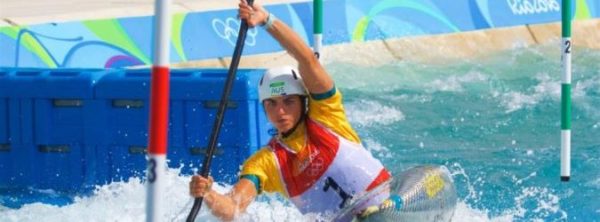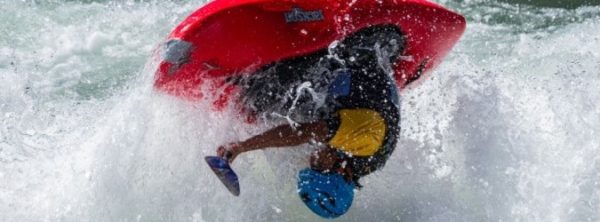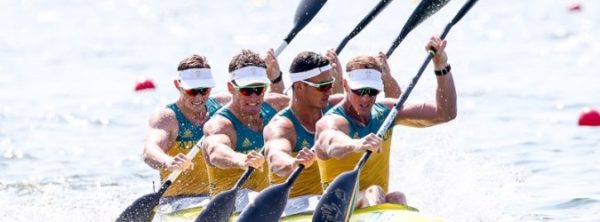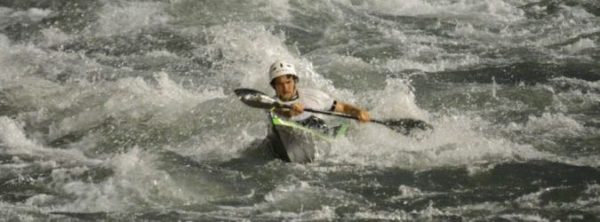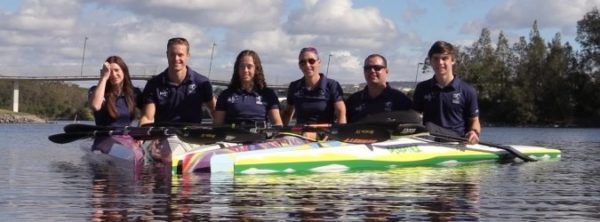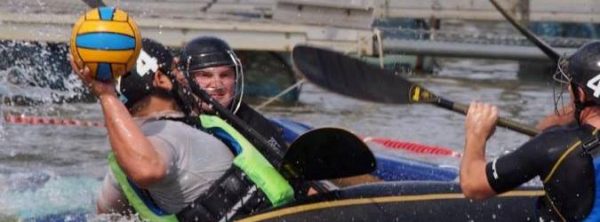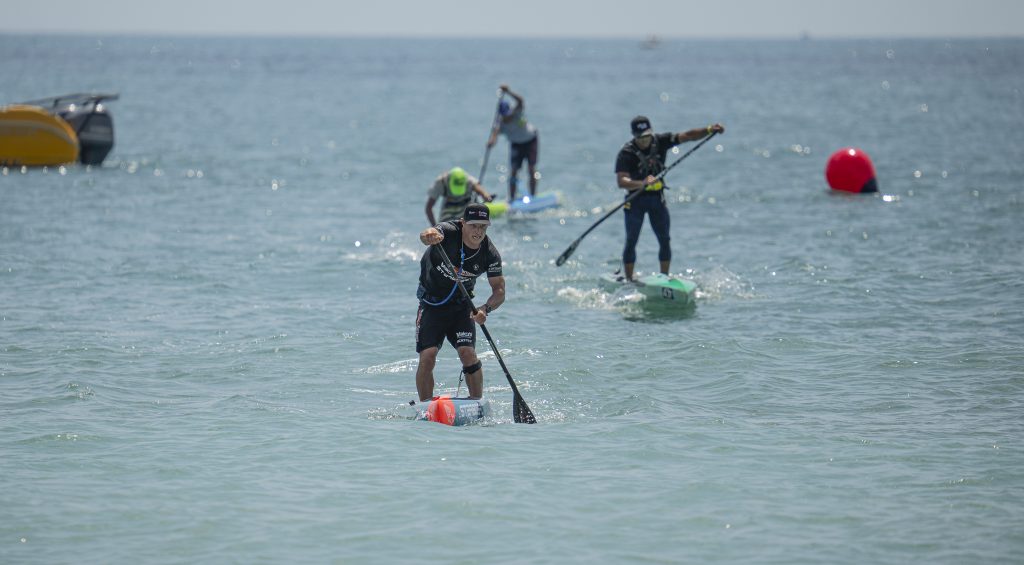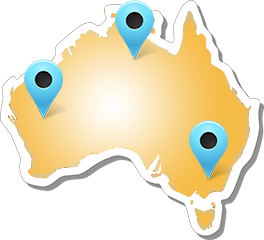Foundation Stone (To 1949)
Initial records show Ross Chenoworth, on behalf on the Victorian Amateur Canoe Association, wrote to Betty Baynes, Secretary, River Canoe Club (NS) proposing the formation of a Federal Association on 7 July, 1947.
Chenoworth pursued this dream with enthusiasm and persistence. By May 1949, contact had been made with four States (Victoria, New South Wales, South Australia and Queensland) and an agreement reached to form an Australian Canoe Federation.
An added impetus to this development was the necessity for an Australian Canoe organisation to be affiliated with the International Canoe Federation prior to the 1956 Olympic Games in Melbourne. The Australian Olympic Federation was also encouraging a national body from which Olympic athletes could be selected, and officials designated to plan and organise the canoe events at these Games.
Subsequently on 10 September 1949, delegations from the Victorian Amateur Canoe Association and the NSW Association of Canoe Clubs met at the home of Harry Savage in Bexley NSW o finalise the Constitution. The inaugural meeting of the Australian Canoe Federation followed this workshop.
Delegation Members:
NSW: Os Brownlee, Max Hill, Albert Jopkins, Max Nathan, Frank Pinder, Ted Riley
Victoria: Ross Chenoworth, Arthur Howard, J Riddle, George Varcoe
Queensland and South Australia: Apologies received
Minutes of Inaugural Meeting of the Australian Canoe Federation 10 September 1949.
| Present: |
NSW Delegates: |
Max Hill and Ted Riley |
|
Victorian Delegates: |
Ross Chenoworth and George Varcoe |
Constitution: G Varcoe moved that the Constitution as agreed upon by the delegates fro the Victorian Amateur Canoe Association and New South Wales Association of Canoe Club be adopted. Seconded by M Hill and carried.
It was agreed that as soon as possible copies of the Constitution should be circulated to the respective State Association, particularly South Australia and Queensland, so that they can adopt it and immediately elect their delegates.
The following officers were elected:
| Officers: |
President: |
George Varcoe (V.A.C.A.) |
|
Vice Presidents: |
Os Brownlee (N.S.W.A.C.C.)
Bill Morrow (S.A.A.C.C.) |
|
Hon. Secretary-Treasurer |
Ross Chenoworth (V.A.C.A.) |
G Varcoe then took over the position of Chairman.
Finance: R Chenoworth suggested that £25/-/- would be required to meet initial expenses. After Ted Riley had pointed out that NSW Delegates would, under no circumstances, agree to unnecessary early payment of Affiliation fees to the ICF, he moved that the levee be 6d. for each financial member in the Canoe Club s affiliated with each State Association. Seconded by M Hill and carried.
Racing Rules: It was unanimously agreed that the Victorian Amateur Canoe Association would be responsible for the racing rules as required in clause 10 (a) of the Constitution. Three members would be co-opted by the President and Hon. Secretary-Treasurer under clause 5(b)9 of the Constitution.
Owing to the lateness of the hour the meeting was closed at 12:00am.
Ross Chenoworth
Hon. Secretary-Treasurer
International Debut (1949-1959)
Australian canoeists appeared on the international scene at the 1956 Olympic Games, gaining notoriety with a bronze medal to Dennis Green and Walter Brown in the K2 10,000m event. Edith Cochrane finished 5th in the LK1500m event. Team Management and Officials were selected from the NSW and Victorian Canoeing family.
In 1958, George Varcoe was elected as Australia’s first representative to the International Canoe Federation (ICF) Board of Management, following four years acting in the role of ICF correspondent.
The Australian Canoe Federation affiliated with the ICF in 1951, which proved to be a year of much activity of the home front. The first national Sprint Championships were held at Lake Albert (Victoria) on 23 March with the four member States represented. In November 1951, the ACF recognised the first marathon event – known as the Australian Jubilee 100-mile Marathon Canoe Race (Penrith to Peats Ferry Bridge, Brooklyn, NSW).
By the end of 1953 both Queensland and South Australia had not renewed their membership of the ACF and were not reinstated until 1961 (South Australia) and 1983 (Queensland).
In conjunction with the Australian Sprint Championships at Penrith 23-25 April 1955, the first National Slalom Championships were conducted by the Cruising Canoe Club (NSW) downstream below the Penrith weir.
Of interest, in 1956 a racing K1 from Denmark cost £41.00, but import tax to Australia increased the price to £161.00.
By 1959 State Affiliation fees to the ACF were £10.00.
New Technology (1959-1969)
By the early 1960’s, fibreglass technology had revolutionised boat construction and provided a fast and economical means of manufacturing canoes for either competition or Whitewater touring. Canoe clubs made boat moulds readily accessible to members, leading to a noticeable increase in canoe numbers and on-water activity across all disciplines.
Three Olympic Games were held in this decade – 1960 Rome, 1964 Tokyo and 1968 Mexico City. At each Olympic Games, Australian canoeists performed well, with John Southwood and Adrian Powell gaining the best result with the place in the Men’s K2 at the Mexico Olympic event.
This was a steady time of development with the Australian Capital Territory (ACT) joining the ACF in 1963 and Western Australia on board by 1967.
In 1964 a Safety Committee was established primarily to develop a Safety Code for Canoeing which was endorsed in 1966.
The Victorian Sailing Canoe Club formed an ACF sub-committee for Canoe Sailing in 1969. The success of this venture is difficult to determine as scant mention is made in later records.
Growth and Expansion (1969-1979)
Tremendous growth and development took place fro 1970 with new clubs formed in all States and the discipline of Slalom and Wildwater Racing recognised with committee status by the ACF.
This growth coincided with recognition by the federal Government in 1974 with a grant $6400 for international team travel and $4967 for State Teams travel to National Championships. In 1975 this grant to canoeing increased t $18,997 before a complete withdrawal of support for national sporting associations by the Federal Government in 1976.
In 1971 the ACF recognised the founding fathers with Life membership and John Egger was the first Australian representative to compete at the World Championships in Slalom and Wildwater Racing, Merano, Italy.
The Munich Olympic Games in 1972 witnessed a sprint racing team of 7 competitors and the debut of slalom on the Olympic program. Frank Whitebrook and Helen Brownlee were appointed as slalom judges at Augsburg. Dennis Green competing in his 5th Olympic Games carried the Australian Flag in the Opening Ceremony.
Tasmania joined the ACF in 1972 giving a total of 6 State affiliations.
Helen Brownlee won the 1st international slalom medal with 3rd in LK1 teams event at Llangollen, Wales in 1972. this era was a time of significant growth for slalom with a team of 5 athletes competing in the 1973 World Championships at Muotathal, Switzerland and the first World Championship medal won by Kym Purdy and Stuart Dry with 3rd place in 1977 for Men’s C2 at Spittal, Austria.
In 1974 the first sprint team (8 athletes) to compete at ICF Regattas in Romania, Yugoslavia and Germany qualified in the Men’s K4 crew at all finals. Buoyed by this successful debut, a Junior Sprint Team (6 athletes) competed at the 1975 Junior World Championships, Rome with placing’s in Men’s K1, Ladies K2, Men’s K4 and Ladies K1 events.
The 1976 Olympic Games in Montreal saw a reversal to sprint racing events only a team of 8 athletes in K2, LK2 and K4 events.
An ACF Award Scheme Handbook was published in 1976 following the establishment of the Board of Canoe Education in 1975. by 1978 six States were conducting canoe courses and Award exams.
Helen Brownlee was the first woman ever appointed to an ICF technical Committee in 1976 as a member of the Slalom and Wildwater Committee.
Marathon achieved full committee status in 1979 and a Canoe Polo Steering Committee was established following an interstate competition at Brady’s Lake (Tasmania) between NSW, Victoria, Western Australia and Tasmania.
World Championships (1979-1989)
During the 1980’s the Federation was promoted to international prominence through the success of our athletes on world level competitions and the achievements of individuals who made significant contributions to the development of the ICF across all disciplines. By close of the era, the ACF held claim to six current World Champions and gained recognition by the Federal Government as one of seven sports to receive increased funding for elite development programs, over and above the normal grant allocation.
The 1980 Moscow Olympic Games heralded a new era for Australian Sprint canoeing when all athletes reached finals and John Sumegi won silver in the Men’s K1 500m.
A National Coaches Panel was established as a forerunner to the development of accreditation course for coaches across Australia and the inclusion of sprint canoeing as an Australian Institute of Sport (AIS) program in 1987.
In 1980 the first national Canoe Polo Championships were conducted at Easter 1981 on the Murray River.
1981 also saw the commencement of publication of ‘The Australian Canoeist’ magazine.
Due to the increased workload on the honorary administration it was necessary to employ a part-time administrative assistant (Mandy Linden) in 1982. this move eventually led to a full time National Executive Director (Joan Morrison) in 1986 and the establishment of an office in Sports House, Sydney.
The 1984 Los Angeles Olympic Games continued the winning streak with Barry Kelly and Grant Kenny 3rd in the K2 1000m sprint. To be bettered at the Seoul Olympics in 1988 by Grant Davies (2nd in K1 1000m) and Kelvin Graham and peter Foster (3rd in K2 1000m).
John Jacoby led the charge in world marathon events winning the men’s K1 World Cup for three successive years before claiming the World Championship crown I 1988. Jane Hall also won gold at the 1988 Marathon World Championships in LK1 with Denise Cooper and Gayle Mayes making the trifecta in the LK2.
In an historic appointment, Helen Brownlee was elected President of the Australian Canoe Federation in 1985 and then elected to the ICF Board as their first female director in 1988.
Martin Hunter successfully concluded the era by winning the Men’s K1 500m World Championships crown, the same year as the opening of the AIS Canoe Unit facility on the Gold Coast, Queensland.
Olympic Gold (1989-1999)
As a fitting climax to the elite athlete development programs, Clint Robinson claimed Australia’s first Olympic gold at the 1992 Barcelona Games in the Men’s K1 1000m.
No to be outdone, Danielle Woodward, in Australia’s debut at Olympic slalom events, brought home silver with two perfect runs in the LK1 and the Men’s K4 1000m (Kelvin Graham, Ian Rowling, Ramon Andersson and Steve Wood) snatched bronze in a superb team effort on the Olympic regatta course.
The 1990’s commenced with a move of office to the newly located Sports House at Wentworth Park, Ultimo in 1991. That same year the CIF Board Meeting was conducted in Sydney and Mike Mills-Thom wins gold in the Men’s K1 World Marathon Championships in Berlin.
Australia hosted the 1992 World Marathon Championships in Brisbane where Steve Wood and Ramon Andersson claimed gold in the Men’s K2.
The Australian Olympic Committee established in 1993 a Gold Medal Plan to support athlete preparation and participation following the announcement of Sydney as the Host City for the 2000 Olympic Games.
In 1994, the Australian Men’s and Women’s Teams claimed victory in the inaugural World Canoe Polo Championships in Sheffield, Great Brittain. Gold medals were also won in sprint and marathon World Championships, the Sydney International Regatta Centre at Penrith was opened and Uncle Toby’s introduced the OzKayak program. Jacqui Mengler became Australia’s first Junior Sprint Champion in the LK1 500m in 1995 at Yamanashi, Japan.
The highlight of 1997 was the reinstatement of canoe slalom on the 2000 Olympic Games program after months of negotiation with the deal brokered between the ICF, Penrith City Council and the NSW Government. Construction of the Penrith Whitewater Stadium commenced in late June 1998, with the 1999 Australian Team Selection event conducted in Easter of 1999.
The Atlanta Olympic Games in 1996 achieved three bronze medals by Clint Robinson (K1 1000m), Andrew Trim and Daniel Collin (K2 500m) and Katrin Borchert and Anna Wood (LK2 500m)
Australia hosted two World Championships in 1996, Canoe Polo in Adelaide, SA and Canoe Sailing at Port Stephens, NSW. The Australian Men’s Canoe Polo Team retained their World Title in 1996 and again in 1998. The Women’s Team placed second in 1996 and then regained their supremacy with a golden win in 1998 in Portugal.
Successful sprint team competed in the 1997, 1998 and 1999 World Championships where Katrin Borchert and Anna Wood established a solid hold on the LK2 events.
By 1998 some 320 canoeing coaches were officially accredited and the strategic plan ‘Paddling Towards 2000’ was finalised.
In these final years all efforts were focused on the preparation of elite sprint and slalom paddlers leading into the 1999 Olympic Qualification events with the prize of Olympic gold in 2000, as well as the accreditation of officials for the conduct of the Olympic canoe/kayak events in Penrith.
A fitting finale to 1999 saw all kayak boats qualified for the 2000 Olympic sprint events (Australia was only one of four nations to achieve this) and all boats (K1, LK1, C1 and C2) qualified for the 2000 Olympic slalom events.






